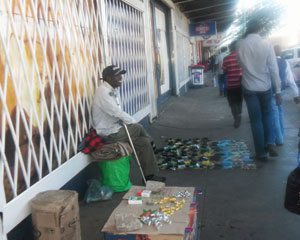
SCORES of disabled people who used to survive on begging have joined the vending business in Bulawayo.
Report by Musa Dube
Among these are the mute, deaf and others with various disabilities. The illegal vendors sell a variety of stuff ranging from sweets, airtime, cellphone accessories and cigarettes, just to mention but a few.
One of the people with disabilities, Elliot Ncube of Tshabalala suburb, told The Standard that he used to beg in the streets but decided to venture into the more lucrative vending business.
“Since 2000 I have been begging in the street, but I could spend the whole day without getting a dollar, so last year I decided to start vending. I sell airtime cards, cigarettes and sweets,” he said.
“Selling is better than begging because due to the economic crisis in the city, no one can just give anyone anything for nothing,” added Ncube.
Another vendor, Elizabeth Ngwe-nya said she used to work for a clothing company in the Belmont industrial area in Bulawayo but got retrenched in 2009.
“I did a course in cutting and designing and used to work for a clothing company but unfortunately I was retrenched.
- Chamisa under fire over US$120K donation
- Mavhunga puts DeMbare into Chibuku quarterfinals
- Pension funds bet on Cabora Bassa oilfields
- Councils defy govt fire tender directive
Keep Reading
“After losing my job I wanted to start my own small sewing company at home, but I did not have the machines and capital and that’s why I am here on the streets selling anything for survival,” said the 24-year-old woman.
The Bulawayo City Council and the police appear to be lenient when it comes to arresting the disabled vendors selling their wares on the streets.
“The city fathers have been generous with us, as they have never arrested us and we would have loved them to give us proper vending bays where we can operate from,” said Ngwenya.
She said operating on the streets exposed them to various problems such as contracting diseases. ‘It’s difficult for the disabled to secure employment’
Bulawayo’s King George VI Centre school head, Perseverance Hadebe, said most of their students were facing challenges in securing employment upon completing their studies due to economic challenges and the negative attitude of some employers.
King George VI is a centre for the disabled and teaches a wide range of academics, arts and vocational skills.
“Our students are struggling to get employment. The very few that are getting employment get it through the relationship that we have with the companies, for example Femina Garments, that usually takes some of our former students,” said Hadebe.
“Soon after graduating, some of the students come back and work at the centre, but we still have a big challenge of where to take our students for employment,” she said.
Hadebe said the situation was being exacerbated by the failure of some of the students to proceed to tertiary education that demands mathematics, a subject that the students found difficult to pass.
“Even after completing their studies here, continuing to tertiary education and going to university is still a challenge. Our students are struggling with maths and we would want a scenario where our students probably could be allowed to do a different type of maths like core maths so that they will be able to pass and can be enrolled in various colleges and universities or polytechnics,” said Hadebe.
The school head challenged companies and relevant stakeholders to come to the school and see the excellent work that their students were doing.
“We call upon employers to partner with us and we also want them to visit and see how we operate. This would help them realise that our students are capable of excelling in whatever assignments they are given,” said the school head.
Bulawayo hit by company closures
According to the Minister of Industry and Trade, Welshman Ncube, the total number of companies that have closed in Bulawayo has reached 100 since the establishment of the inclusive government.
The clothing and textile industry suffered the most.
Big clothing and textile companies such as Archer, Security Mills, Belmor, to mention but a few, have downsized production citing viability challenges while others have completely shut down resulting in over 25 000 workers losing jobs.
A number of these workers were physically handicapped.











